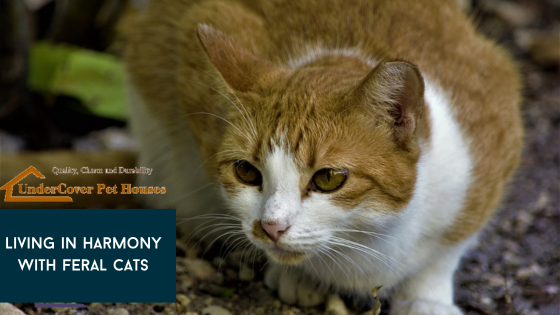 Loading... Please wait...
Loading... Please wait...How to Respect and Protect the Feral Cat Colonies in Your Area
Posted by Danny MacDonald on 2023 Nov 3rd

Feral cat colonies or clusters can be found in communities across the globe. Often, they navigate their way through rural and suburban neighborhoods and landscapes.
Feral cats are not the same as the typical pet cats. They're basically descendants of lost or abandoned domestic cats, forced to adjust to outdoor life and facing harsh conditions. These cats form clusters and live in tightly-knit territorial groups to help each other with hunting and survival.
As responsible individuals, it's essential to not only respect these colonies but also take steps to protect them. In this blog post, we'll explore practical ways to help protect feral cats in your community area.
1. Provide food and water.
Feeding feral cats can help ensure their continued survival, but it must be done responsibly. Place food and fresh water in designated feeding areas to avoid attracting unwanted wildlife.
Additionally, remove any uneaten food promptly to maintain a clean environment.
2. Shelter
Feral cats don't have the luxury of cozy beds and heated homes. Providing them with simple shelters, like outdoor cat houses or repurposed storage bins, can protect them from the elements.
Ensuring feral cats have a safe place to stay during harsh weather, such as winter, is a pure act of kindness.
3. Veterinary care
Feral cats can face many health challenges due to their outdoor lifestyle.
If you're caring for a colony, try to provide them with regular vet care, including vaccinations, flea control, and addressing any medical issues that may arise.
4. Trap-Neuter-Return (TNR) programs
Take feral cats for TNR programs. This humane and game-changing method for feral cat colonies involves trapping, neutering, or spaying and returning the cats to their original location.
TNR programs help control the feral cat population and reduce their difficulties while preserving their lives.
5. Respect their space
Respecting feral cat colonies and territory is essential. We can avoid disrupting their habitats and not attempting to bring them indoors.
While they can be tamed, feral cats are not necessarily suitable for domestication and will be much happier living freely outdoors.
6. Feral cat awareness
If you're caring for feral cats in a residential area, it’s vital to maintain open communication with your neighbors. Inform them about your efforts to protect and respect these cats while addressing any concerns or misconceptions they may have.
Also, advocate for feral cats, especially regarding respecting and caring for their colonies. Share information about cat feeding and TNR programs and encourage others to get involved in the cause.
7. Secure funding and support
Successful feral cat care programs often require support and funding. Seek support and assistance from local animal welfare organizations. You can also set up fundraising initiatives to ensure you can continue your welfare efforts over the long haul.
Bottom Line
Protecting and respecting feral cat colonies in your area is an act of kindness and a responsibility we should all embrace.
By understanding their unique needs, providing food, water, and shelter, and promoting TNR programs, we can all make a positive impact on the lives of feral cats.
Additionally, such animal welfare actions help maintain the balance between humans and the feral cat population, creating a more harmonious community for all.
